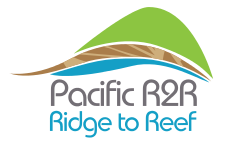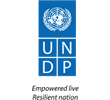From understanding, to the practical application of Ridge to Reef principles, the Pacific R2R Programme has presented participating Pacific Island countries an opportunity to test, refine, replicate and upscale an emerging and sustainable, development paradigm. Longer-term investment in R2R mainstreaming, concepts, practices and policies could prove model for up-scaling at the level of large continental river basins, linked coastal and marine areas.
As an integral part of the GEF strategy, the Pacific R2R Programme has provided unique opportunities to support country capacity development (formally and informally) of local professionals to sustainably govern and manage their priority environmental issues and contribute to global environmental benefits.
To highlight some of the impacts of the training and capacity building activities to date, the Regional Programme Coordination Unit conducted a rapid online survey serves to showcase experiences.
In 2017, the Pacific Community (SPC) R2R programme partnered with James Cook University to deliver the Post Graduate Program in Ridge to Reef Sustainable Development. The R2R post graduate programme provides educational pathways from 2 years for the certificate to an additional year for the diploma.
Participating countries include: Cook Islands, Federated States of Micronesia , Fiji, Kiribati, Nauru, Niue, Palau, Papua New Guinea, Republic of the Marshal Islands , Samoa, Solomon Islands, Tonga, Tuvalu and Vanuatu.
| Name |
Feagaiga Penivao |
|
Job title |
LMMA Officer |
|
Country |
Tuvalu |
|
Project |
STAR R2R Project |
|
Organization name |
Tuvalu Ridge to Reef Project |
Which formal (accredited) capacity building/training activity has been the most successful for your project and/or stakeholders?
Ecosystem Dynamics, R2R Tools, R2R Governance, Integrated Management of R2R Ecosystems, Policy
Why have each of these that you have identified been successful?
it expanded my knowledge about processes and tools that can be used in the implementation of conservation projects.
What were your key learnings from each subject you identified as successful?
Tools used for data collection
How have you applied these key learnings in your work? Please give examples.
Conducting biodiversity monitoring survey
What opportunities has applying these learning provided for your community/country? Please give examples.
Environmental assessment of certain ecosystems needed for rehabilitation or development.
What were some of the challenges you faced with the formal training and capacity building activities?
Some training are not align with Pacific Islands context and not well cleared.





